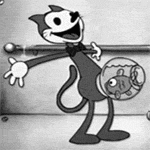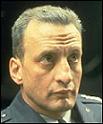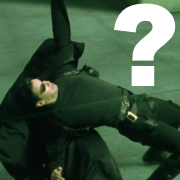|
New crime/comedy caper film from David O. Russell (The Fighter, Silver Linings Playbook) based on the FBI ABSCAM Operation in the late 70s to early 80s. Staring the actors you see in the poster below and also Louis CK, and Jack Huston (Richard from Boardwalk Empire). IMDb - Trailer - Rotten Tomatoes: 94% - Wikipedia Just got back from the theaters and surprised to find that there's no thread for this movie. Easily the best film I've seen this year. Great characters, acting, dialogues, and great script overall. Louis CK acted really well and stole all the scenes he was in. Fans of Boardwalk Empire will also get a kick out of seeing Richard kicking rear end and getting the girl. Currently 94% on Rotten Tomatoes, go see it if you don't want to see standard holiday movies like Frozen or The Hobbit. waxluthor fucked around with this message at 22:25 on Dec 25, 2013 |
|
|
|

|
| # ? Apr 16, 2024 09:30 |
|
Caught this today and definitely a film to see before the end of the year. Everyone's acting in it is superb, but I felt Christian Bale and Jennifer Lawrence carry the film. I really liked how after the opening scene, the following 15 minutes were almost completely told in a narrative of how Bale and Adams characters met. I swear Louis CK plays the same guy in everything, but he has mastered that role, and I don't think I'll ever get tired of him. Slandible fucked around with this message at 00:01 on Dec 26, 2013 |
|
|
|
Totally opposite opinion here. I couldn't tell if the problem was because of source material (I.e. Adhering to a specific take on a work itself loosely based on real events) but this was a mess somehow of both plot holes and contrivances. Great performances, excellent costume design/production, but otherwise a huge let down. I would not recommend that anyone see this. Not in lieu of some of the better fare out right now, anyway.
|
|
|
|
bam thwok posted:Totally opposite opinion here. I couldn't tell if the problem was because of source material (I.e. Adhering to a specific take on a work itself loosely based on real events) but this was a mess somehow of both plot holes and contrivances. Great performances, excellent costume design/production, but otherwise a huge let down. Can you go further on this? I just got back from seeing it. Aside from Bradley Cooper playing, well, Bradley Cooper in this film, I think it was extremely well done and everything wrapped up at the end very neatly. My step-father called Cooper's character "tragic", but I could never relate to him. At the end, I was glad he got hosed over by everyone and became a footnote at best.
|
|
|
|
I enjoyed it, as well. I think the great acting goes to how well-written the characters must have been to start with. Obviously since it's a David O. Russell work (actually a reworking of the other guy's script, originally titled American Bullshit, which I somehow want to see more) so that's to be expected but I saw a thing where Bale wasn't sure how a scene fit with the plot and Russell said to not worry about it and focus on building character, or something like that. This is one of those films that I really enjoy listening to the people who worked on it discuss. Like casting Louis CK as the FBI Supervisor which will literally never stop delighting me. Or how they digressed from the real story. Or about much of the "comedy" not actually being in the dialogue (and this being a weird movie to try to classify or explain to someone who hasn't seen it) I want to compare this to Silver Linings Playbook for some reason (because that's what I saw last Christmas) and my first thought is that this is a bigger cast working even better together. By the way, excellent work by Elisabeth Röhm (Law & Order: Vanilla's Lesbian ADA) for hiding in plain sight as the mayor's wife. I didn't even realize she was in it til the credits.
|
|
|
|
uublog posted:I enjoyed it, as well. I think the great acting goes to how well-written the characters must have been to start with. Obviously since it's a David O. Russell work (actually a reworking of the other guy's script, originally titled American Bullshit, which I somehow want to see more) so that's to be expected but I saw a thing where Bale wasn't sure how a scene fit with the plot and Russell said to not worry about it and focus on building character, or something like that. According to IMDB Russell said "Christian, I hate plots. I am all about characters, that's it." Which makes sense, because the movie shines when the characters are playing off one another but as a whole narrative I didn't think it worked great. It was definitely a big love letter to Scorsese especially in terms of the pacing, but I don't think Russell pulled it off nearly as well (go figure). but, as a comedy, it's one of the funnier movies I've seen in awhile. I kept thinking that Bradley Cooper's character was like a Charlie Day trying to do detective work sort of thing.
|
|
|
|
Slackerish posted:According to IMDB Russell said "Christian, I hate plots. I am all about characters, that's it." What's the deal with this exactly? Whose idea was it for Russell to do this after Silver Linings? This was clearly a very plot heavy movie and out of Russell's strengths (character-based comedy/drama).
|
|
|
|
I saw the movie on Christmas Eve and liked it. My main problem was I though the heavy handed setting of the movie really detracted from the story overall. Literally every second of the movie through music, set, dress, comb-over montages, sepia tone filters were constructed to rub just when the move was set. I mean it looked retro to us but the funny part is to the characters in the movie everything must have been brand new with a shiny 1978 price tag stuck on it. I felt like the setting was the joke, in whole, behind the movie and the characters were thus purely caricatures. I liked the story but it's hard to have a serious plot on the set of Happy Days. If we look at movies from the era, which are extremely dated to 1970's New York, Dog Day Afternoon or Taxi Driver for instance, you notice that it's not 100% of everything that dates the era, they live in a world with things from the past, you can't set 100% of the world brand new to an era and make it relatable. Bip Roberts fucked around with this message at 13:00 on Dec 26, 2013 |
|
|
|
The broken bones posted:What's the deal with this exactly? Whose idea was it for Russell to do this after Silver Linings? This was clearly a very plot heavy movie and out of Russell's strengths (character-based comedy/drama). Um, my guess is it was Russell's? I'm imagining after directing two Best Picture noms in a row you pretty much get carte blanche over what you want to do next.
|
|
|
|
Dusseldorf posted:I saw the movie on Christmas Eve and liked it. My main problem was I though the heavy handed setting of the movie really detracted from the story overall. Literally every second of the movie through music, set, dress, comb-over montages, sepia tone filters were constructed to rub just when the move was set. I mean it looked retro to us but the funny part is to the characters in the movie everything must have been brand new with a shiny 1978 price tag stuck on it. I felt like the setting was the joke, in whole, behind the movie and the characters were thus purely caricatures. I liked the story but it's hard to have a serious plot on the set of Happy Days. Some of this is based on a true story. The movie revels in artifice and misdirection. The production design isn't some amateur hour accident.
|
|
|
|
DarkSol posted:Can you go further on this? I just got back from seeing it. Aside from Bradley Cooper playing, well, Bradley Cooper in this film, I think it was extremely well done and everything wrapped up at the end very neatly. Agreed on Bradley Cooper being distractingly bad for this role. Not a bad technical performance - same goes for everyone, really good performances -, just...ugh, I honestly can't articulate it any better than you did. Every time he was on screen I wished he would just go away or get shot or something. Please excuse all of the black bars below. I wanted to use a lot of specific examples and err on the side of not spoiling plot points. Generally speaking, a lot of my dissatisfaction comes from a pretty long list of "wait a minute..." moments after leaving the theater. Not the least of which is the plot hole that the entire instigating premise of this movie is that Bradley Cooper has Amy Adams dead to rights on fraud and impersonation, presumably after having done a relatively competent investigation, but then later on is just utterly loving flabbergasted that SHE ISN'T ACTUALLY BRITISH AND IS USING AN ALIAS. I mean what the hell. That doesn't make any goddamn sense. As to plot contrivances, for example, the ending was pure deus ex machina. Oh, it turns out that the lawyer was actually some other guy with a funny job. I see, you tricked us!. It's one thing to have a twist arise from clues that were inevitably missed by characters and maybe slipped past an intelligent viewer. But it's another to not have those clues entirely. Without them, the movie has no claim to being clever, which is an accolade I've seen plastered all over it by reviews. Ocean's 13 was smarter than this movie when it came to setting up and consummating its cons. Then there were moments of the plot that just stretched the limits of my suspension of disbelief (which is tough for a historical drama not about vampire hunters). Bradley Cooper not only being allowed to sit in on, but able to participate in and end the deposition of the boss he had just very seriously battered and threatened with a weapon, receiving virtually no reprimand whatsoever? I would be shocked to find out if this is one of the modicums of truth in this film. Even if it was, it's a case of fact being stranger than fiction, and contributed to the mess. I loved that Louis CK had something to do in this movie, but jesus. But I get that David O Russell is a character guy, not a plot guy. That's fine. There was nothing particularly intricate about the story of Silver Linings Playbook, for example. But the characters in that film had believable motivations. Although unpredictable and unhinged, they still acted in ways consistent with those motivations, and generally followed an emotionally credible pattern of growth. American Hustle missed that mark on that pretty badly. Characters acted in ways that weren't internally consistent, that were exceedingly mercurial in their motivations, and generally substituted quirks and espousals for genuine development. The worst offender here was Jeremy Renner. We know he is a guy who loves the people of New Jersey because he said so about a billion times. And fine, I'll take his characterization as an upstanding, pragmatic public servant at face value. But what exactly turned him from the guy who said 'No thanks!' to a briefcase from a stranger to paying off Congressmen at the behest of the mob? True story or not, that's a serious about face that made no sense for the character. Either I missed that the whole movie is a treatise on pathologically lying retards bumbling their way through history, or there are some really debilitating problems here. Because it definitely didn't work as the "smart-but-flawed manipulators on both sides of the law finding themselves increasingly in over their heads" movie I was sold in the trailers. I also found the style and 70s glitz to more of a liability than an asset. But I guess that's probably my most subjective criticism. What the hell was the point of that three-minute jaunt into not-Studio 54 anyway? It was already made pretty clear that Cooper and Adams were careening towards each other without it. Was it just so they could do a disco scene and have R-rated sexy moments in the bathroom (plus ADR jokes)? All that, plus a criminally underutilized De Niro. Felt like barely more than a cameo. Maybe I should've just gone to see Madea instead. edit: All actresses named Amy are not the same bam thwok fucked around with this message at 23:49 on Dec 26, 2013 |
|
|
|
Maarak posted:Some of this is based on a true story. The movie revels in artifice and misdirection. The production design isn't some amateur hour accident. What do you mean by this? I understand the movie was stylized to look like a faux hyper-70's. I didn't like that. bam thwok posted:All that, plus a criminally underutilized De Niro. Felt like barely more than a cameo. Well it was an uncredited cameo, I agree that it was a high point in the film.
|
|
|
|
Dusseldorf posted:Well it was an uncredited cameo, I agree that it was a high point in the film. That's surprising, given how important his character was to the third act. And another thing! It doesn't make any loving sense that in the end, we'd find out that De Niro was suddenly cool with being conned by, and then nearly indicted because of Bale and Adams. In the less than ten lines of dialogue he had, the most important thing he said was that he would take it as a sign of disrespect and there would be deadly consequences if anything about the deal wasn't above board. I mean, that was the entire point of his character. This was the first time it looked like the stakes are high enough to actually care, and they just hand-wave it away with one line from that guy who has a perfectly nice other side of his face? I should've just seen Frozen. bam thwok fucked around with this message at 08:47 on Dec 28, 2013 |
|
|
|
bam thwok posted:Agreed on Bradley Cooper being distractingly bad for this role. Not a bad technical performance - same goes for everyone, really good performances -, just...ugh, I honestly can't articulate it any better than you did. Every time he was on screen I wished he would just go away or get shot or something. You know, as I was asking my parents about this same thing, but I couldn't remember if Amy Adams was using her accent or not during the initial interrogation or not. If she was, then it dovetails in nicely with her statement about how she had all of her paperwork changed up to her birth to give the Edith character legitimacy. If she wasn't, remember, Bradley Cooper's character was crushing on Amy Adams, and was willing to semi-bend the rules during that same scene. That and he was so happy to bust them, so far stuck up his own rear end about how big he "was" and the ever expanding scope of the investigation, he may have just plain forgot that she was conning everyone with the accent. quote:As to plot contrivances, for example, the ending was pure deus ex machina. Oh, it turns out that the lawyer was actually some other guy with a funny job. I see, you tricked us!. It's one thing to have a twist arise from clues that were inevitably missed by characters and maybe slipped past an intelligent viewer. But it's another to not have those clues entirely. Without them, the movie has no claim to being clever, which is an accolade I've seen plastered all over it by reviews. Ocean's 13 was smarter than this movie when it came to setting up and consummating its cons. I never felt that the ending was pure deus ex machina as Bale and Adams's characters were established to be confidence tricksters. They even say that while Bale's character was being threatened by the mobster and his goon, he came up with the con to practically gently caress the feds and Bradley Cooper's character over. Why would they need to hint it at it, when they practically bludgeon you upside the head that it was a con? Remember when Bale went to Jeremy Renner's house? Bale pleads with him to hear out what the plan was. What happened was the plan! quote:American Hustle missed that mark on that pretty badly. Characters acted in ways that weren't internally consistent, that were exceedingly mercurial in their motivations, and generally substituted quirks and espousals for genuine development. The worst offender here was Jeremy Renner. We know he is a guy who loves the people of New Jersey because he said so about a billion times. And fine, I'll take his characterization as an upstanding, pragmatic public servant at face value. But what exactly turned him from the guy who said 'No thanks!' to a briefcase from a stranger to paying off Congressmen at the behest of the mob? True story or not, that's a serious about face that made no sense for the character. I feel like this is where Bradley Cooper's character first fucks up. He's too eager to make the bust and is trying to force the money on Renner's character. However, I don't think they ever established that Renner was upstanding. While he gave off the outward appearance of a wholesome, white-bread American, there were little signs that you may have missed that showed he had his flaws. Like wiping his hand and slightly grimacing after shaking hands with a black man. He was a state assemblyman and a mayor, but he also knew that you had to grease the right palms to get the job done. quote:I also found the style and 70s glitz to more of a liability than an asset. But I guess that's probably my most subjective criticism. What the hell was the point of that three-minute jaunt into not-Studio 54 anyway? It was already made pretty clear that Cooper and Adams were careening towards each other without it. Was it just so they could do a disco scene and have R-rated sexy moments in the bathroom (plus ADR jokes)? I felt that this part was a good counterpoint to Bale and Lawrence finally semi-enjoying each others' company. Adams was feeling left out and was probably either playing Cooper up, or was reacting out of spite towards Bale. While Bale and Lawrence were acting all classy with Renner, Cooper and Smart went to a "trashy" nightclub. It also really accentuated how hyper and how out of control Cooper's character was with the whole situation. It took Amy Adams to pretty much talk him down from almost having sex in the stall. VVVVVVV Thanks! I fixed it. DarkSol fucked around with this message at 23:25 on Dec 26, 2013 |
|
|
|
The actress is Amy Adams, not Amy Smart.
|
|
|
|
Amy Smart is not in this movie guys. You know who is in this movie though? Jeremy Renner. He was incredible in this. I loved all the use of visual technique to try and box audience expectation of him into the same "corrupt politician with mob ties" category that DiMaso reduces him to. There's a wonderfully clever little shot when Polito and Rosenfeld are at the diner and they head over to Polito's car. The vague talk about a gift, the shot from the interior of the trunk, Rosenfeld's bewildered experession, these are all familiar-to-the-point-of-cliche signifiers of ominous mafia times. Polito's "gift" is probably some guy he beat and tied up in his trunk! Nope, it's a science oven. The thematic thread running through this film about needing to present yourself and understand yourself as someone different from who you are (or were) is an obvious one, it's not really even subtext. But I love the companion theme, not quite as brazenly stated, about how boxing others into these too-small categories is just as much a survival mechanism. See: the undertone's of Rosalyn's new relationship at the end, DiMaso's attempts to guess the ending to Thorsen's ice fishing story. Or, hell, the whole point behind the Rembrandt forgery allegory.
|
|
|
|
That movie poster in the OP has one of my biggest pet peeves in it. Not sure why it bothers me but the names of the cast should be in order according to the order they are standing in the actual picture.
|
|
|
|
DarkSol posted:You know, as I was asking my parents about this same thing, but I couldn't remember if Amy Smart was using her accent or not during the initial interrogation or not. If she was, then it dovetails in nicely with her statement about how she had all of her paperwork changed up to her birth to give the Edith character legitimacy. If she wasn't, remember, Bradley Cooper's character was crushing on Amy Smart, and was willing to semi-bend the rules during that same scene. That and he was so happy to bust them, so far stuck up his own rear end about how big he "was" and the ever expanding scope of the investigation, he may have just plain forgot that she was conning everyone with the accent. Okay, well if we accept that the answer here is either stupendously blissful ignorance or gross incompetence, then this is another example of testing the limits of my suspension of disbelief rather than a plot hole, and is no less offensive to my sensibilities. quote:I never felt that the ending was pure deus ex machina as Bale and Smart's characters were established to be confidence tricksters. They even say that while Bale's character was being threatened by the mobster and his goon, he came up with the con to practically gently caress the feds and Bradley Cooper's character over. Why would they need to hint it at it, when they practically bludgeon you upside the head that it was a con? Remember when Bale went to Jeremy Renner's house? Bale pleads with him to hear out what the plan was. What happened was the plan! "Conner's gonna con" and a tearful insistence that there is a plan doesn't save this from being half-baked, even as Bale describes it needing to be "the best they've ever done". That was it? That was the best con in this movie? That didn't come with an 'ooooh' or 'aha! you got him good!' moment for me. Again, I feel like this whole enterprise had was built up to be smarter in a way that it never lived up to. I want to believe that there is a cleverer, more tightly-plotted version of this movie hiding in there somewhere if you can just filter out the tangents and garishness. That might be my bias for more conventional story-telling showing, but it was deeply unimpressive. quote:I feel like this is where Bradley Cooper's character first fucks up. He's too eager to make the bust and is trying to force the money on Renner's character. However, I don't think they ever established that Renner was upstanding. While he gave off the outward appearance of a wholesome, white-bread American, there were little signs that you may have missed that showed he had his flaws. Like wiping his hand and slightly grimacing after shaking hands with a black man. He was a state assemblyman and a mayor, but he also knew that you had to grease the right palms to get the job done. I took his casual, Jeresy-fied racism to just be another concession to the era rather than a character flaw. His Brady Bunch family (they even stood on the stairs in a row) was picturesque, and he adopted an inner city black kid. If there was one character in this film meant to defy Bale's suggestion that the world is gray, not black-and-white, it's this guy. His role was to be an earnest white-knight victim; the first mark of Bale's that he couldn't describe as a desperate bad guy. His conscience incarnate, who even in drunken moments of intimate confidence would inevitably talk about the good things he could do for his constituents. This character's behavior in the third act made no sense to me at all. quote:I felt that this part was a good counterpoint to Bale and Lawrence finally semi-enjoying each others' company. Smart was feeling left out and was probably either playing Cooper up, or was reacting out of spite towards Bale. While Bale and Lawrence were acting all classy with Renner, Cooper and Smart went to a "trashy" nightclub. It also really accentuated how hyper and how out of control Cooper's character was with the whole situation. It took Amy Smart to pretty much talk him down from almost having sex in the stall. Difference of opinion then. I thought it was superfluous.
|
|
|
|
Jonny Angel posted:Amy Smart is not in this movie guys. Well, what about change? All of the main characters changed somehow from when they were first presented in the movie. Rosenfeld and Prosser went legit. Rosalyn found a man who was there for her. DiMaso had the most drastic change, but then ended up being right where he started. He reached too far and ended up being the same faceless G-man he was at the beginning of the film. As for Polito, he was presented as this wholesome, everyday guy with this loving family, and ended up being almost as unctuous and violent as the mobsters in the movie. I mean, Rosalyn did state that she was afraid she was going to die before she changed. Interesting sidenote, the person that Rosalyn was based off of killed herself in 1982. I wonder if the neckbrace was foreshadowing that. Or was it implied that Pete was abusing her? Or am I reading more into it than I should and it was really just a car accident? DarkSol fucked around with this message at 23:51 on Dec 26, 2013 |
|
|
|
DarkSol posted:Interesting sidenote, the person that Rosalyn was based off of killed herself in 1982. I wonder if the neckbrace was foreshadowing that. Or was it implied that Pete was abusing her? Or am I reading more into it than I should and it was really just a car accident? I interpreted that to signify that her character had not changed, and remained a clutzy agent of chaos. Another part of the "things are returned to normal, but with our protagonist slightly better off" ending.
|
|
|
|
I didn't realize how funny this would be before I saw it. Definitely a great end-of-the-year watch. I also loved Shea Whigham's brief appearances and haircut.
|
|
|
|
Yo Darksol your post is great and brings up a lot of interesting points but right now I'm kinda just giggling at the violence done to spoiler tags in it. Okay done with that now. I absolutely agree that the idea of self-change and re-invention is one that the movie examines and plays with a lot, but I'm a little more conservative in my estimate of how much character change actually takes place. I feel like Russell is highlighting the limit of re-invention and the possibilities brought on by self-acceptance. DiMaso is the guy who's most in denial out of anybody. Let's run the checklist: Refuses to acknowledge his own fiancee, is shocked to learn that Sydney is American despite claiming to have checked her records thoroughly, refuses to let Thorsen finish his story multiple times and instead tries to force his own endings onto it, believes it unquestioningly when the supposed lawyer for these ultra-cagey mobsters tells him "We can commit all of these exact crimes for you" without having frisked him. How does that turn out for him? Sure, Rosenfeld and Sydney go legit at the end, but it's also predicated on abandoning all the affectations that their con artist lives revolved around. This is particularly noticeable with Sydney, who at one point is curling her hair into those tiny ringlets just like DiMaso, but soon enough pulls back from the excesses of self-deception that they signify. (She literally equates said ringlets to her own identity fraud) I also disagree to some extent about Polito. His last scene with Rosenfeld is indeed incredibly violent, but I don't look at it as some indication of him having sunk to the depths of the mobsters. To me, he's what he always was: a crude, volatile, often ignorant guy who nonetheless does have his heart in a really good place. The guy's breaking down in tears as he's beating Rosenfeld down. He's still this figure who's practically a kid, who's lashing out right now because of how drat unfair it is that New Jersey won't get saved the way he wanted it to. Of course, the darker side of the coin of the "self-acceptance" theme is the idea that the status quo is a lot more immutable than we'd like. You can try and reinvent yourself, sure, but it's going to be within the bounds set by those in power. Hence Rosenfeld's speech to DiMaso that nobody who's actually dangerously crooked actually got punished at all here. The only ones that got busted were those who stuck their necks out to try and make a change for New Jersey, whereas the ones who were involved in a darker and more self-interested way were canny enough to shield themselves from accountability. A fair bit of this film's thematic content feels like a less vitriolic, less bitterly critical companion to Pain & Gain, both of which deal with the idea of American self-improvement mythologies as dangerous and toxic (American Hustle has much less contempt for those who buy into these myths, however), and both of which suggest that in a world this deluded and poisoned and rigged, your best bet for happiness is honest, mutual love.
|
|
|
|
bam thwok posted:I interpreted that to signify that her character had not changed, and remained a clutzy agent of chaos. Another part of the "things are returned to normal, but with our protagonist slightly better off" ending. I don't think she was nearly as klutzy as you think she was. I mean, Rosenfeld outright says that she was able to trick him, and we see that happen. You can tell she knows what she is doing when she takes advantage of Rosenfeld's love for the son he adopted multiple times The only time she is really klutzy, not counting when she puts metal into the "science oven", is when she reveals to Pete that the feds are part of the goings on. And she's doing it only because she's lashing out at Rosenfeld and is in this really vulnerable moment with Pete.
|
|
|
|
Slackerish posted:Um, my guess is it was Russell's? I'm imagining after directing two Best Picture noms in a row you pretty much get carte blanche over what you want to do next. That's what I thought when the movie was first announced, but it'd be really weird for him to pick such a plot-heavy movie and then tell his actors "gently caress the plot, just be the character." Worse yet, if he did pick it, then it means he probably doesn't know his best strengths. Doesn't bode well for his future
|
|
|
|
uublog posted:I want to compare this to Silver Linings Playbook for some reason (because that's what I saw last Christmas) and my first thought is that this is a bigger cast working even better together. There are a few movies I'd make a comparison to that all focus on cons and stings like Duplicity, Argo, and, well, The Sting. Unlike crime thrillers, they don't tend to have half the cast killed by the end of their running time, as that's the sort of resolution the con artists (and by extension, the script-writers) are trying to avoid. When Silver Linings Playbook came out, it took people around me by surprise, with a lot of "I know it's a Rom-Com, but it's really good," as if no one expected a movie focused on a relationship to really hit people emotionally. As aforementioned, that seems to be David O. Russel's trademark for now, to pull characters out of actors. That, and the Sam Raimi-esque zoom-in close-up he uses to unbuckle the audience in emotional scenes.
|
|
|
|
Jonny Angel posted:The thematic thread running through this film about needing to present yourself and understand yourself as someone different from who you are (or were) is an obvious one, it's not really even subtext. But I love the companion theme, not quite as brazenly stated, about how boxing others into these too-small categories is just as much a survival mechanism. See: the undertone's of Rosalyn's new relationship at the end, DiMaso's attempts to guess the ending to Thorsen's ice fishing story. Or, hell, the whole point behind the Rembrandt forgery allegory. I really like this interpretation, and helps me understand a few of the things that I was having problems with when I first saw the movie. All in all, I really enjoyed this movie. I got dragged to see it by a friend after ignoring him telling me to watch the trailers several times, and knew practically nothing about this before I went to the theater. I think I had seen one commercial for it, and had known it was a comedy. Other than that, flying blind. With that said, I thought it was really great, and quickly got wrapped up in everything. I can understand the people who have problems with the plot, it wasn't the most developed thing in the world, but I side with the people who say the character's make up for it. Everyone was fantastically well-acted and given a lot of life. Also, I'm really glad that there's finally a thread for it. I saw it last week and kept debating making a thread for it, but I was too lazy to make an op.
|
|
|
|
Jonny Angel posted:The thematic thread running through this film about needing to present yourself and understand yourself as someone different from who you are (or were) is an obvious one, it's not really even subtext. But I love the companion theme, not quite as brazenly stated, about how boxing others into these too-small categories is just as much a survival mechanism. See: the undertone's of Rosalyn's new relationship at the end, DiMaso's attempts to guess the ending to Thorsen's ice fishing story. Or, hell, the whole point behind the Rembrandt forgery allegory. I'd like to think I'm smart enough to digest your analysis here but you clearly saw more here than I did. Can you explain the forgery allegory and your "boxing others in" themes more? I'm really interested in those parts but didn't get those in the movie.
|
|
|
|
Gladly! "This Rembrandt over here. People come from all over the world to see this. It's a fake. People believe what they wanna believe. Cause the guy who made this was so good that it's real to everybody. Now who's the master? The painter? Or the forger?" That's Rosenfeld's speech about the painting, or at least an approximation of it. (I transcribed it it from this teaser and don't recall how much got elided from the actual film) The idea is that people want to see a Rembrandt here, they expect to see a Rembrandt here. It's a prestigious art gallery, Rembrandt is a prestigious painter, this painting looks very much like a well-known Rembrandt, so it's the painting in question. People project their expectations and demands onto the object, regardless of what it actually is. This is the core of the boxing-in theme, the idea that people will see what they want to see in others and act accordingly, to the detriment of those they box in or themselves. So: Rembrandt the painter is somebody comfortable in his own skin, who has his own creative output and presents it to the world. He's not playing any games, he's just an incredibly talented guy whose paintings were well-received. The forger is somebody who picks up on the need of the observer to have their observations conform to their expectations, and thrives on it. Rosenfeld suggests that the forger the "real master" because he operates with a deeper understanding of human nature. Presenting your true self, that's an unnecessary risk, because God knows how people are going to react to your true self. Presenting yourself as Rembrandt, that's the smart play. Everyone loves Rembrandt. We already know that. DiMaso is the character that most actively does this boxing-in, though Rosalyn deserves an honorable mention when she talks about her new boyfriend as being so sweet and dedicated, willfully ignoring the fact that he's an obvious mobster and obviously partially using her to get information on the true nature of the Sheikh's proposal. But DiMaso's the motherlode. He wants to hear the ending of Thorsen's story badly enough that he keeps asking him about it, but not badly enough that he ever lets him finish it, because DiMaso feels confident enough to extrapolate the ending and moral after a few details. He wants to put Polito in the box of "dangerous, scheming, corrupt official" (and so does the camera, at points! See my first post in this thread, talking about the trunk shot) so he focuses on Polito as a big get even as our perspective increasingly aligns with Rosenfeld's, that Polito is largely a sympathetic and idealistic victim in all of this. And then there's his ultimate fate, wherein his insistence on seeing the "mob lawyer" as exactly that, his insistence on believing something too good to be true, is what causes him to overreach hugely and get zero credit for the operation. This is Rosenfeld taking the role of the forger in the allegory: he knows what DiMaso wants to believe, he gives it to DiMaso, and he profits off it. DiMaso projects his beliefs and expectations onto everything, regardless of what it actually is. To the detriment of those he boxes in (Polito) and himself.
|
|
|
|
I think there's a major "boxing in" that comes when DiMaso believes that "Edith" is just Irving's associate, a girl who got caught up in the glitz of the lifestyle who's not actually a serious con artist. He's predisposed to believe everything but the obvious lie (that she's royalty) because he never thinks that she would extensively fake her identity on her own. It's funny, because he assumes she's like him and that turns out to be true- it's just that he doesn't realize his self-image is wrong. He's got tunnel vision when there's something he wants to see. I think that the movie presents everyone- DiMaso, Irving, Edith, Polito, upstanding members of society and suave criminals- are pulling a con and being conned in some fashion. Irving plays everyone, but is used by DiMaso and Rosalyn. Edith wants DiMaso to make Irving jealous and vice-versa (same with Irving for Edith and Rosalyn), but maybe it's just that they want whoever they can't have at the moment. Polito's a good man, he's just a good man who had to make hard choices, et cetera, et cetera, cost of doing business, I'm doing it for my constituents. Honestly, his actions are realistic as hell. Unfortunately, I don't think this pays off for the ending where they just go straight? It felt unsatisfying. I don't mind Irving and Edith "winning," it's just that every part of the story is setting them up for destruction. The movie makes it clear that both of them just have to have what's out of their reach, they're both in way over their heads, and they're inevitably crossing some major people, either the mafia or the FBI. But then nothing happens. I don't want a morality play where the wicked are punished, it felt that Edith and Irving just cut ties too cleanly. I just left the theater thinking "that was it?"
|
|
|
|
I'm generally predisposed to happy, sentimental endings, so take this with a grain of salt, but I was a fan of how it ended. There's something brave about people like Irving and Sydney, who are both so drat frightened of themselves throughout the movie, being brave enough to try being somewhat sincere. Sure, there's a lot of danger to their old lifestyle, wrong side of the law, etc., but there's also the comforting safety of knowing that you're passing your work off as a Rembrandt and everyone loves Rembrandt. Here's the big risk they take at the end: are their authentic selves even a tiny fraction as interesting as Rembrandt's? The movie doesn't tell us either way. But that's the risk they take when they decline the familiar route of posturing, deception, and self-deception. When they decline the American Hustle (2013, dir. David O. Russell), so to speak.
|
|
|
|
Saw this tonight, knew nothing about it going in, wow I loved it to pieces. It rides conspicuously heavy on Scorsese's jock (especially Goodfellas/Casino) but really there's nothing wrong with an artist/director wearing their influences on their sleeve as long as they do so with talent and style and bring something new to the formula. I wouldn't quite call this a "comedy" though there are definitely moments that are incredibly (often uncomfortably funny). I love dialogue-heavy, character-driven movies with an uneasily grey sense of morality, and American Hustle was super satisfying in that regard. It feels a little bit like a sexed-up drugged-out version of Glengarry Glen Ross. I love how much of the movie can be seen through the lens of "what is real and what is the con?" The ending: I liked it, if a little begrudgingly. It was a little neat and tidy, given the uneasy and alluring ambiguity of the previous parts of the movie, but I was invested enough in the characters that I liked the message of hope at the end.
|
|
|
|
Jonny Angel posted:Gladly! Nicely put.
|
|
|
|
Cole posted:That movie poster in the OP has one of my biggest pet peeves in it. Not sure why it bothers me but the names of the cast should be in order according to the order they are standing in the actual picture. I can't stand it too but when movie posters have the main actors appear somewhat in a line the names are almost never listed in same order. The names are always listed from left to right or top to bottom starting with the first billing actor/actress and ending with the person who gets the "With" and/or "And" billing if there is one. But the first billing actor/actress always either appears the biggest or near the middle. Some examples:   
waxluthor fucked around with this message at 13:13 on Dec 27, 2013 |
|
|
|
That has to do with differences in Billing and poster contracts. It's very common and nothing to get upset about. DarkSol posted:The only time she is really klutzy, not counting when she puts metal into the "science oven", is when she reveals to Pete that the feds are part of the goings on. That was probably the least klutzy thing she did. She knew exactly what she was doing and what was going to happen. She was conning as good as anyone else. I thought the film was good but really struggled at the beginning. The first half did a lot of telling and not showing and needed maybe half the voice overs it had. Very painful to watch, but once it caught up to the point the movie started it really picked up.
|
|
|
|
Precambrian posted:Unfortunately, I don't think this pays off for the ending where they just go straight? It felt unsatisfying. I don't mind Irving and Edith "winning," it's just that every part of the story is setting them up for destruction. The movie makes it clear that both of them just have to have what's out of their reach, they're both in way over their heads, and they're inevitably crossing some major people, either the mafia or the FBI. But then nothing happens. I don't want a morality play where the wicked are punished, it felt that Edith and Irving just cut ties too cleanly. I just left the theater thinking "that was it?" I think I'm going to have to disagree partially with you on this. Irving was always about the small con. Even in the first act, when he and Edith were building up their "empire", it was still based on the small con. When DiMaso kept reaching for the stars, Irving kept trying to talk him back down to reality. I feel like after the whirlwind adventure that DiMaso and Edith put him through, having to deal with bigger and bigger cons with no payout in sight, and his health starting to waver, I could buy him wanting to just get out of the business. For the sake of his health and his son. He was willing to sacrifice everything for his son. And in the end, he sacrificed his life of crime for stability for his child.
|
|
|
|
I like looking at Amy Adams.
|
|
|
|
origami posted:I like looking at Amy Adams. I want to shake the hand of the costume designer, for similar reasons
|
|
|
|
American Hustle had all the trappings of a masterful film: Trunk shots borrowed from Tarantino, the legend himself, De Niro, as the big bad mob boss, the period stylings of Argo, the promise of titillating sex, corrupting drugs, and an intricate miasma of "what's the con and what isn't?" hanging over the characters' heads. But all of those are subverted. The trunk shot reveals a tchotchke. De Niro has less than 5 minutes of screen time, and his threat miraculously evaporates. The over-the-top production design serves as a distraction and repulses us rather than invites us into its ambiance. As best as I can recall, for a movie that looked to be as sexy and drug-addled as this one, no one has any actual sex (and the subject is consistently avoided or balked at; in the flashback to Sydney's stripper days, her nipples are fully covered. Rosenfeld's son is only his by adoption, removing even the implication of him having sex. Syndey delays and rebuffs DiMaso's advances until the last possible PG-13 moment [and quickly turns violent when it crosses that threshold]), and aside from DiMaso quietly snorting a pinch of coke/uppers and then doing nothing in particular besides politely stand around, the most commonly used drug was heart medication, and its consequences were nil. And the cons/lies are appallingly superficial, never with more than one layer, and never lasting particularly long - conceived and planned unseen between cuts. The metaphor of the forger as the true master is an obvious one, but it does not do a particularly good job of describing the characters. What does, however, is the very first scene of the movie when Rosenfeld, with an expert, practiced routine, ornately styles his comeover only to be immediately exposed by DiMaso. The aspirations and actions of these characters to present themselves masterfully as something they are not is laughably bad. Rosenfeld, from the get go, looks like the smarmiest, least trust-worthy man in history, and everyone seems to have this impression of him right away. Sydney's British accent is preposterously bad -an imitation of what a posh English lady might sound like that only a former stripper from Albuquerque could devise. DiMaso is Mr. Magoo-like in his lack of prowess in law enforcement, and every single one of his schemes or ideas is immediately identified as pathetically dumb by those around him. And yet, the plot is contrived such that every other character plays along with them each step of the way, even their adversaries as they defy their own instincts with only the flimsiest of reassurances. But more damning than that, the audience has no choice but to play along, too. They are forced to accept and tolerate the garish production, the frankly baffling actions of characters that constantly contradict themselves, jarring switches in voice-over perspective, indulgent shots borrowed from other directors, Bradley Cooper with a perm, the length, and logic-defying plot developments, lest they have to admit that what they're watching isn't masterful at all, but a forgery. Scorsese this is not. His movie is in the theater two doors down. I think this matter of projection and boxing in, to detriment, is an apt commentary on the audience's and critics' relationship with the film more so than within the film itself. There is a lot of projection going on w/r/t implied depth and layered duplicity in character's actions and lines than what actually exists. Whether this was intentional, I'm not sure, but it would certainly make me feel better about about my misgivings on the plot, some perplexing character behavior, and generally a film which stretches the limits of credulity. And maybe this was just my experience, but I think at some level people understand that this film is deeply flawed, and wool is being pulled over their eyes. In the past I've gone to the theater to see other films - that earned far less than the unanimous praise being heaped by critics on this one - solicit pretty vigorous applause, where the audience will turn to each other and say "wow, that was great". This was not one of those occasions. Packed theater on Christmas day, and it only roused a polite smattering of applause, with a much more muted ad resigned mood. Resigned to accept that we had just seen a work of art drenched in accolades, and that if our visceral reaction to it was of disappointed befuddlement, well, surely the critics know better than we do. And maybe getting people to buy into that is the only one of David O Russell's cons that actually felt unexpected. Therein lies the true American Hustle - that a giant mess of a movie with all the right names attached to it, opening on the right day, with a flashy trailer and a leaked video of Jennifer Lawrence making out with Amy Adams, can snowball its echo-chamber of praise into a nice box office and awards season take before anyone takes notice of what's really going on beneath the surface. I should've just gone to see Saving Mr. Banks. bam thwok fucked around with this message at 23:28 on Dec 27, 2013 |
|
|
|
American Hustle was cool as hell and a very good movie, IMO way better than The Hobbit: The Desalination of Smaug or w/e. Also there was at least one sex scene with at least two frames of full-on nipple so I don't know what that nerd up above me is on about.
|
|
|
|

|
| # ? Apr 16, 2024 09:30 |
|
at the date posted:American Hustle was cool as hell and a very good movie, IMO way better than The Hobbit: The Desalination of Smaug or w/e. Also there was at least one sex scene with at least two frames of full-on nipple so I don't know what that nerd up above me is on about. I must have fallen asleep during it and dreamt about dragons instead
|
|
|























